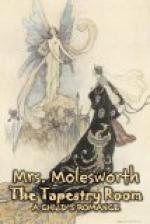“And Monsieur said no more; but in his own mind I could see that he thought himself fast dying, that want of comforts and nourishment much longer would exhaust his little strength, and that his poor Jeanne would, in the end, be forced to attempt the journey back alone. They were sitting at the end of the terrace walk that evening—the end near little Charlotte’s balcony; it was a mild, still evening—it seemed less dreary and miserable than in the house; from the distance came the sound of the children playing in the old streets, and near at hand some birds were singing still—for children will play and birds will sing whatever happens. Suddenly a sound close at hand made Mademoiselle Jeanne look up. And I too, for I was close beside them on the terrace, I looked up in amazement, half imagining it must be a dream. For we heard—both Mademoiselle Jeanne and I knew it again—the sound of the window on to the balcony opening, the window through which the little English girl used to come out to meet her friends. We looked and could scarcely believe our eyes. Out on to the balcony stepped a young lady, a young girl rather she seemed, for she was tall and slight and had fair curls about her sweet fresh face. She stood for one instant looking at us all as if bewildered, then, with a sudden cry, almost before we knew what she was doing, she was over the railings and down the bank.
“‘Mademoiselle Jeanne or Mademoiselle Eliane!’ she cried, ’which of you is it? for it is one of you, I know! And you are not dead—not all dead and gone—and there is Dudu, too. Oh, how glad, how very glad, I am that I came!’
“Laughing and crying both at once, she threw herself into Madame’s arms, while Monsieur looked on in amazement.
“‘You know me?’ she cried—’your little English Charlotte. See, here is the bonbonniere,’ feeling for it in her pocket as she spoke. ’And you are Mademoiselle Jeanne. I know you now—if you had twenty peasant caps on I should know you. But how thin and pale you are, my poor Jeanne! And is this your husband? I knew you were married. I saw it in the newspapers ever so many years ago. Do you know it is fifteen years since I went away? And I am married, too. But tell me first how it is you are here and dressed like that, and why you look so sad and Monsieur so ill. Tell me all. You may trust me, you may indeed, and perhaps my husband and I may be able to be of some use. You may trust me,’ seeing that Madame and her husband looked at each other in bewilderment; ’may they not, Dudu?’ she added, turning to me. ’Tell Mademoiselle Jeanne that she can indeed trust me.’
“I flapped my wings and croaked.
“‘You see,’ said Charlotte, and at that they all laughed.
“‘It is not that we do not trust you, my dear friend,’ said Madame; ’and indeed you see all in seeing us here as you do. There is nothing to tell but the same sad story that has been to tell in so many once happy French homes. But explain to me, my dear Charlotte, how you are here. It is so strange, so extraordinary.’




